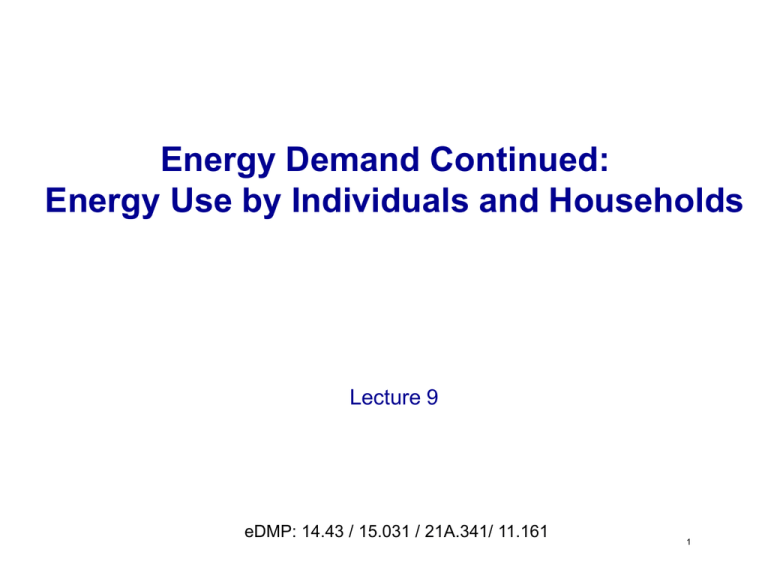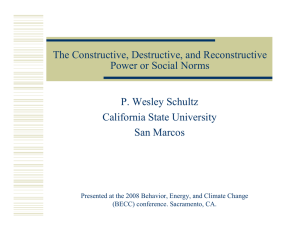
Energy Demand Continued:
Energy Use by Individuals and Households
Lecture 9
eDMP: 14.43 / 15.031 / 21A.341/ 11.161
1
Monday, Economics of Energy Demand
-- Demand for energy is derived from demand for products
and services that consume energy, thus mediated or derived
-- Variations in derived demand depend on fixed capital
investments as well as short run and long run expectations
-- Income and price elasticities are generally limited– constraining
ability to maximize with efficient responses
-- People do not always optimize their decisions – lots of possible
efficiencies not pursued, Amory Lovins $$ on the sidewalk:
imperfect information; riskiness, uncertainty of future savings
-- Overinvest in energy efficiency, which turns out to be not
economically efficient
Prius example, extra cost will not be recouped by reduced
energy consumption
2
Why do we see economically nonoptimal decisions?
The $64,000 question.
How do people act? Why do people do what they do?
The mission of all of social science.
The division of labor in social science:
--psychology: what goes on in one mind
--sociology: what happens when two or more minds/persons
interact, patterns of aggregation of action
--economics: coordination of production and distribution of
goods and services through markets (exchanges of
self-interested actors)
--political science: coordination through organized collective
action and force; the state as the monopoly of force
--anthropology: the system of circulating signs, symbols, values
that is culture; practices producing and enacting culture
3
Contributions from basic social science:
Individuals and households
Outline for today
• How do people make decisions: variations and vocabularies of motive
• Cognitive Science and the sociology of decision-making
• Experimental evidence concerning energy decisions
• Ironies of individualism and popular psychology
Future classes: organizations/firms, states (public policies)
4
How do people make decisions?
General model of human action
A set of concepts – terminology used to describe observable
phenomena
Theories – integrated concepts, not all quantified
Quantified model/ theory:
E=a(Pe)-e(e)e-1
Conceptual model/theory:
Fsc=1/Isc
formal social control is inversely related to
informal social control:
Theories and concepts/language derivations often tacit
Social science: to make explicit and describable through
systematic, transparent, empirical observation what is unseen, tacit,
unspoken in human action
5
How do people make decisions?
What accounts for the variations in motivated/
social action?
(C. Wright Mills, Situated Action and Vocabularies of Motive, 1940)
1.
Motives as subject states - produced inside the person
arguments from ‘nature’, not nurture
Different kinds of persons
biology (blood, dna)
personality, psychology, evolutionary biology
‘man makes history’
Unique and independent individuals, society as aggregate of
Individual wills, desires, interests, Locke, JS Mill, Hayek, Friedman
2. Motives as accounts of expectations, consequences
anticipated (sociology, historicism, pragmatism)
arguments from ’nurture’ not nature
situated action (Dewey, CW Mills)
culturally learned and deployed (Bourdieu, habitus)
A. Smith, Theory of Moral Sentiments
‘history makes the man’
Personhood, identity, will, desire interests produced
contingent, conditional opportunities, constraints
Weber, Durkheim, Polanyi, Marx, Rousseau
6
How do people make decisions: variations and
vocabularies of motive
Social action: when a person or group takes account of others
How are others taken account of? (Max Weber, 1913, Economic Sociology)
•rational orientation to a system of discrete ends;
expectations as to behavior of objects in the external
situation and other persons, making use of these
expectations as conditions or means for achieving
the actor’s ends/goals
-- economic rational actor
•rational orientation to an absolute value; involving
conscious belief in some ethical, aesthetic, religious
or other form of behavior entirely for its own sake
and independent of prospect of external success –
-- virtue, conserve energy, environmental sustainability
•affect or emotion, feelings, sensations of the actor
-- status, honor, being seen, celebrity
• tradition, through habit and long practice
-- built environment, suburbs, automobiles, habituated preferences
7
e.g. political systems, individualism
Cognitive Science and
the sociology of decisions
Distinguish automatic cognition from deliberate cognition
Automatic cognition: rapid effortless, unintentional thought,
allows quick processing of information without extended review.
Fundamental schema: age, gender, race (US)
Habitual, tacit.
Outside consciousness, more often under stress.
Deliberate cognition: slow, considered and measured thought,
can reject or override schemas and actively search for
characteristics, connections, relations and expectations
rather than assuming them.
Triggered by disruption of routines
8
Some empirical examples of automatic
and deliberate cognition:
1.
Levels of routinization along a contiuum, Heimer (2001).
2. Uncertainty and risk, Auyero and Swistun (2008, 2009).
3. Political auto-pilot, Martin and Desmond (2010).
4. Social movements, language and metaphors:
5. Communication sequences, narrative structure.
9
Experimental evidence concerning energy
decisions
Goldstein, Cialdini and Griskevicius (2008)
“A room with a viewpoint: using social norms to motivate environmental
conservation in hotels”
From Goldstein, Noah, Robert B. Cialdini, and Vladas Griskevicius. “A Room with a Viewpoint: Using Social Norms to Motivate Environmental
Conservation in Hotels.” Journal of Consumer Research 35, no. 3 (2008): 472-82. © University Of Chicago Press. All rights reserved.
This content is excluded from our Creative Commons license. For more information, see http://ocw.mit.edu/fairuse.
Towel Reuse Rates as a Function of
Sign in Room Experiment 1
From Goldstein, Noah, Robert B. Cialdini, and Vladas Griskevicius. “A Room with a Viewpoint: Using Social Norms to Motivate Environmental
Conservation in Hotels.” Journal of Consumer Research 35, no. 3 (2008): 472-82. © University Of Chicago Press. All rights reserved.
This content is excluded from our Creative Commons license. For more information, see http://ocw.mit.edu/fairuse.
11
Measures of social
identity
Towel reuse as a function of
Social identity on sign in room
From Goldstein, Noah, Robert B. Cialdini, and Vladas Griskevicius. “A Room with a Viewpoint: Using Social Norms to Motivate Environmental
Conservation in Hotels.” Journal of Consumer Research 35, no. 3 (2008): 472-82. © University Of Chicago Press. All rights reserved.
This content is excluded from our Creative Commons license. For more information, see http://ocw.mit.edu/fairuse.
12
Take away messages:
People follow norms of others with who feel associated, even
if association not meaningful.
In some circumstances, individuals follow norms of a meaningless
and unimportant identity rather than meaningful and
important if connection is based on uncommon
characteristic.
If had a sign with important and uncommon characteristic may
have been most effective.
13
Other social norm and incentives
for energy efficient decisions
Suggestions?
- Use peer influence, associates, Ash experiments
- Make information visible, feedback
14
EPA Label that applies to vehicles before the
2008 model year
EPA Label that applies to 2008 through 2012
model year vehicles
Source: U.S. Environmental Protection Agency. http://www.epa.gov/carlabel/basicinformation.htm.
15
Other social norm and incentives
for energy efficient decisions
Suggestions?
- Use peer influence, associates, Ash experiments
- Make information visible, feedback
-- Mandatory messages; Disclosure statutes
Regulation takes many forms – should not be undifferentiated
concept. To speak with undifferentiated concept is to speak
normatively, with political purpose, not analytically.
16
Ironies of individualism and
popular psychology
Unanticipated consequences??
Information helps but alone does not work; financing also
not sufficient.
Single action bias: small steps can backfire.
Language: using words ‘audit’ and ‘retrofit’ do not work, loss
rather than gain; comfort and wellbeing, self-reliance,
health, join your neighbors
Strategies: find early adopters, create leaders, celebrity, trusted
opinion leaders, modelers, peer contact, local control
17
MIT OpenCourseWare
http://ocw.mit.edu
15.031J / 14.43J / 21A.341J / 11.161J Energy Decisions, Markets, and Policies
Spring 2012
For information about citing these materials or our Terms of Use, visit: http://ocw.mit.edu/terms.


